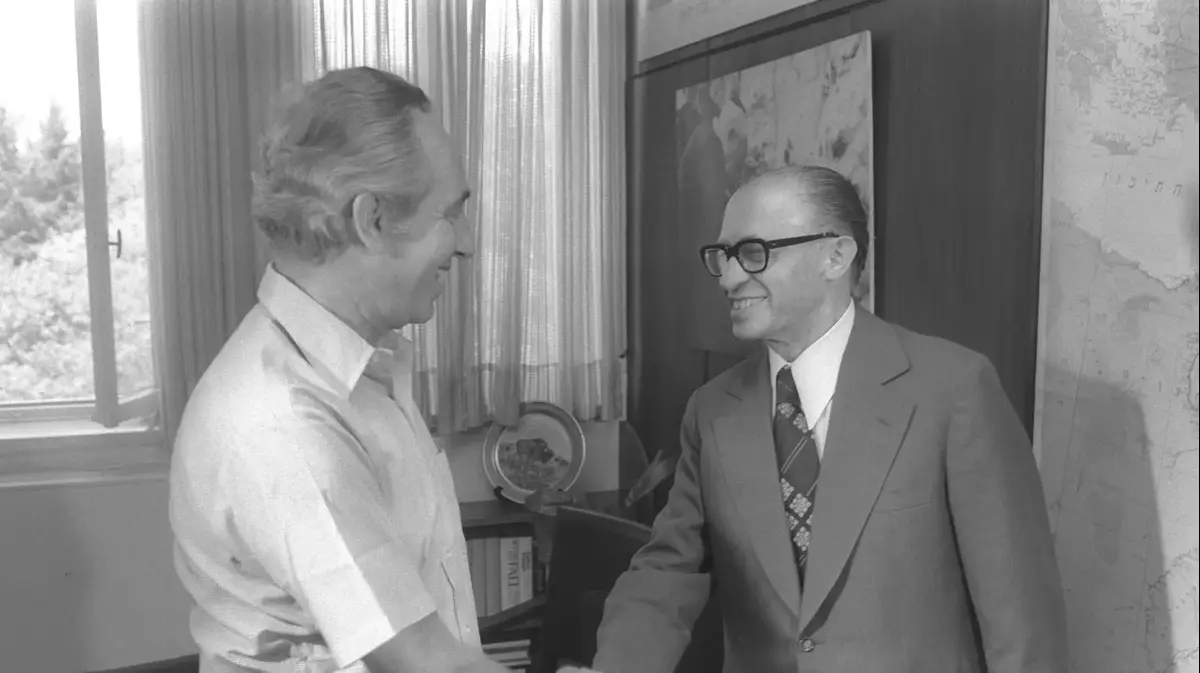news
Opinions and interpretations
Revolution 81: The moment when the Israeli melting pot disintegrated
The political upheaval was in '77, but the real upheaval took place four years later.
Doron Cohen on the culture war that has been going on for 40 years and culminated in the 2021 elections
Tags
Menachem Begin
The Likud
The array
Shimon Peres
Doron Cohen
Friday, 02 July 2021, 13:43 Updated: 13:44
Share on Facebook
Share on WhatsApp
Share on general
Share on general
Share on Twitter
Share on Email
0 comments
This cannot be seen otherwise and should not be ignored: this was clearly the moment when the Israeli melting pot disintegrated into pieces, if it did not shatter into pieces, or at least split into two hostile parts. In aerial photography from a distance of 40 years, the picture looks sharper than ever: the '81 elections turn out to be the most critical and significant that have been here and from a historical point of view even overshadow the '77 upheaval. So much so that it can be proved not only in words but also in numbers.
In the '77 elections, the party led by Shimon Peres lost 19 seats compared to the '73 elections (32 vs. 51).
It did lose power, but an analysis of voting patterns shows that there was in fact no upheaval in Israeli society other than the purely political aspect.
Only 4 of the 19 seats went to Menachem Begin's Likud, while 15 seats remained in the areas of what has since been called "First Israel": they only moved to the DP (Democratic Movement for Change) protest party, led by Independence Chief of Staff Yigal Yadin. It arose in response to the failure of Yom Kippur, the corruption scandals and the general Mapainiki siege.
The tribal demon came out of the bottle.
Begin (Photo: AP)
On the face of it, there was no rational reason for the 1981 election campaign to become the most tumultuous and violent in the country's history. After all, Menachem Begin was then after a dream peace agreement with Egypt and a brilliant operation in which the nuclear reactor in Baghdad was destroyed, the stock market had not yet collapsed, the banks had not yet collapsed, Arik Sharon was not yet defense minister and the IDF had not yet invaded Lebanon. One of the 15 vacant seats of Dash (which has meanwhile disbanded) to function for the Likud. They preferred to huddle and even huddle again under the red flag of the lineup. It is difficult to impossible to find another explanation for this phenomenon other than the general mobilization of "beautiful Israel" in order to rescue the state from "second Israel" and return it to its veteran owners, those who founded it and shaped its image. Indeed, the party got richer in these elections by exactly 15 seats compared to '77, from 32 to 47. It's just that even that was no longer enough in the face of the backlash in the streets and squares.
And the sequel is known
: Since the mass and passionate election rallies of the summer of 1981, the ethnic demon has come out of the bottle and a deep tectonic fragment has opened up here, which has not been reconciled to this day.
The melting pot, the splendor of Ben-Gurionist creation, fell into two: the first Israel versus the second Israel, traditional versus secular, Orientals versus Ashkenazis, "Jews" versus "Israelis."
Which leads to the inevitable conclusion that this was not just an election campaign: it was in fact a civil war - a battle over the image and cultural character of the country - between the "Israelis" (represented by Peres and the campaign to strengthen Dudu Topaz's "Chachachim speech"). And the "Jews" (whom Begin led with his memorable response speech the night after).
More on Walla!
When bureau officials deleted files and left "scorched earth" for the elected prime minister
To the full article
And the "Jews" won
.
Admittedly on the edge of Mandate (47-48), but a decisive victory, for generations.
Since the '81 bang, Israel has become more Jewish, more traditional, much more Oriental.
The members of the Eastern community, the traditionalists, raised their heads, raised their stature and even demanded their share of the cake.
No more the myth of the new sabra that forced them to break away from their past and turn their backs on their parents and their origins, no more blind admiration and indifference to "Salt of the Earth" and "the beauty of the crystal and the title" - the fighting kibbutzniks who walked the fields On TV.
It is safe to assume that without the narrow victory of Begin and the Mizrahis in the 1981 elections, the State of Israel would have been completely different in the last 40 years: more centralized and less capitalist, of course, also more secular and less religious, but mostly more homogeneous and stately - and much less mosaic and tribal.
Deep tectonic fracture.
Peres, 1981 (Photo: AP)
Perhaps Oriental singers from the periphery, such as Zohar Argov and Chaim Moshe in the 1980s or Kobi Peretz and Eyal Golan in the 2000s, could not have grown into the status of Israeli cultural heroes. Perhaps they would have remained in the area of the old Central Station, the company's backyard, light years away from the nearby cultural hall only geographically. Perhaps that elite of the Tzavta and GLC clubs would continue to dictate the cultural agenda in the country. Perhaps the beacon ceremonies on the eve of Independence Day would still be conducted on the purity of Israel's first-respected artists. Perhaps a culture minister who grew up in Kiryat Gat would never have been appointed here. There are so many ministers and MKs here with strange names like Amsalem, Kahlon, Makhlouf, Deri and Ohana.
It was a victory in the photo-finish, but it turned out to be a resounding knockout that changed the face of history and actually lasted for no less than 40 years.
Were the 2021 elections, in which Begin's successor, Benjamin Netanyahu, was ousted, despite his 30 seats (most of them from "Second Israel"), in favor of a candidate who won only 6 seats - sponsored by the media, academia and the judiciary, a Bermuda triangle of "First Israel" The counter-reaction of the veteran establishment that is fed up with the popular revolution that took place here in 1981 and changed the face of the state?
Did the Likud voters return to being the second-class Khachachim and the citizens, an illegitimate herd whose democratic power must be limited in the name of the right to return to the beautiful and good and white land of Israel of old - the one who went to bed smiling with Palmach songs in the 1996 and 2015 elections , But again awoke in the morning terrified to the sounds of drabukos from the neighbors' porch? Questions that are certainly debatable and that should never be swept under the rug.
Share on Facebook
Share on WhatsApp
Share on general
Share on general
Share on Twitter
Share on Email
0 comments









